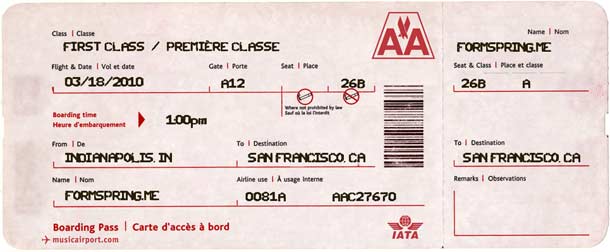News broke yesterday that popular online Q&A startup Formspring.me had raised some $2.5 million in venture funding and would be relocating to Silicon Valley from Indianapolis. As a user and fan of the service, I am happy to see the company rewarded for its success, and I am excited to see how they can improve their already great product. However, as a follower of the national and global startup culture, it is a little disappointing to see the company leave their home and head west to the Valley.

Formspring.me was spun out of Formspring.com, a platform for creating online forms, when users began creating forms to answer personal questions. According to the New York Times’ Brad Stone, Formspring.me has raked in $2.5 million from investors based solely in Silicon Valley. VC firms Baseline Ventures and Freestyle Capital teamed with angels Kevin Rose, Dave Morin and Ron Conway’s SV Angel to provide Formspring.me with some well deserved, and high profile funding.
Silicon Valley is certainly the mecca of venture capital and social web applications, and in many ways, moving the company to the Valley is a smart move. As we mentioned back in January, Formspring.me plans to rewrite its application to scale more efficiently as the product grows in popularity – something that requires talented programmers. The company has already listed four job openings in San Francisco for a pair of developers, a designer and a data analyst.

By moving to the Valley, Formspring.me will be able to tap the enormous talent pools to find top tier programmers and designers to take their app to the next level. If they want to build out an API and create mobile applications for their app, they are in the right place to do it. When the time comes to look for further funding, having set up shop in the Valley will certainly benefit the company in their efforts.
For other cities outside of the Valley looking to build competitive startup and venture capital communities, these are unfortunate truths. It is not uncommon to see successful startups leave their cities of birth for the Valley to find talented employees and raise their chances for finding funding. We recently discussed Chicago’s growing startup scene, which is not far from Indianapolis, but the opportunities in the Midwest do not yet compare to those available in other booming startup cities.
Had Formspring.me been founded in a city like Austin, Boulder, New York or Boston, they would have likely remained there upon receiving funding. That is, perhaps, if they received funding locally. While the Midwest is growing its startup culture, there are far fewer VC firms, and far smaller talent pools when compared to other locations. Until more cities have their own thriving startup scene, stories like Formspring.me’s will continue to play out across the country.
The fact that Formspring.me attracted funding from the Valley before relocating raises the question of whether the decision to move was theirs or if it was a recommendation or stipulation of the investors. We have reached out for comment on this question and will update this post as more information becomes available. In the meantime, let us know what you think of Formspring.me or any other startup moving to the Valley in the comments.
UPDATE: We received a response to the question from the company’s President John Wechsler on his Formspring.me page. Wechsler explains that the decision to move to San Francisco was was made by the team and was not part of the terms of the funding agreement.
“With an all star cast of investors comes some amazing connectivity to potential partners, employees and advisors,” Wechsler writes. “In order for us to make the most of the relationships they bring to the table, we simply need proximity on our side. Without so much as a direct flight between Indianapolis and San Francisco, it’s pretty difficult to build the relationships required for meaningful business partnerships. Could we have successfully built formspring.me in Indy, sure. Will we increase our chances of success by being in close proximity to the world’s most important consumer internet companies, we think so.”
Disclosure: The New York Times is a syndication partner of ReadWriteWeb

















